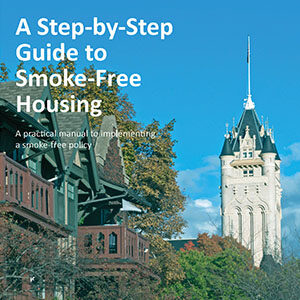Contact Us
Summary Overview
All residents have a right to clean, smoke-free air. Smoking and exposure to secondhand smoke is a risk that causes lung cancer, heart disease, exacerbation of asthma, higher incidence of respiratory illness and other respiratory health issues. Implementing a smoke-free policy, like no indoor smoking laws, is the only effective means to eliminate the health risks associated with exposure to secondhand smoke.
Basics
Secondhand smoke (SHS) is a mixture of side stream smoke from the tip of the cigarette and mainstream smoke exhaled by the smoker. Secondhand smoke contains more than 4,000 chemicals, 250 of which are known to be harmful and more than 50 are known to cause cancer.
- Secondhand smoke can aggravate pre-existing conditions such as heart disease and other respiratory problems
- Infants and children are especially vulnerable to the health effects of secondhand smoke because of their smaller bodies and lungs
- Secondhand smoke can cause people with asthma to have more frequent and severe asthma attacks
Incentives for housing operators to provide smoke-free housing:
- Lower insurance costs
- Reduced fire risk
- New amenities as selling points
- Reduced staff time
- Lower turnover costs
- Improved tenant health Healthy behaviors
Smoke-Free Housing
Spokane or Washington Specific Data
Recommendations
Smoke-free laws have proven to reduce secondhand smoke exposure among nonsmokers, reduce heart attack hospitalizations and also help smokers quit.
- Smoke-free laws reduce asthma hospitalizations and emergency room visits
- Smoke-free laws usually receive high levels of public support and compliance
- Smoke-free laws educate the public about the health effects of secondhand smoke
Related Facts
Secondhand smoke is the cause of an estimated 49,400 lung cancer and heart disease deaths among non-smokers every year in the United States and is known to cause asthma and respiratory infections. (SmokeFreeWashington)

Smoke-Free Housing Toolkit
For landlords and owners, the business benefits of going smoke-free can translate into thousands of dollars.


